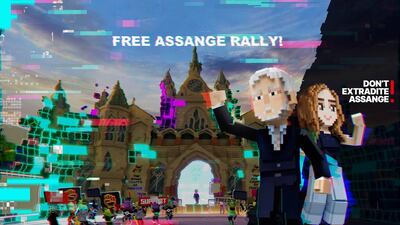You can now send a digital avatar of yourself to a protest – a ploy which campaigners hope will break down barriers across countries, time zones and political climates.
Rallies in what is known as the Wistaverse look a bit like a video game. You have a character that explores a digital world and can interact with other players. You can furnish them with protest signs and T-shirts.
There are various rooms to enter where, for example, you can hear a recorded speech by real-life campaigners. The platform uses a cryptocurrency called Wista to raise money.
For an event on Saturday, in support of Julian Assange, the game has been designed to look like London's Royal Courts of Justice – where the WikiLeaks founder is fighting extradition to the US.
Mr Assange’s wife Stella and former Labour Party leader Jeremy Corbyn are among guests who have contributed speeches. There will be file footage of Mr Assange himself.
Sceptics have wondered aloud whether a protest in an obscure corner of the internet – it uses a gaming platform called Sandbox – can have the same impact as real-world disruptive action.
“The answer to that is protest is also mainly a social event where people with a common vision get together,” one of the Wistaverse’s co-founders, Jules Alcazar, told The National.
“Having everyone together in one place is also a great opportunity to go fund-raising. It’s about keeping momentum, it’s finding what activism can do.”
He believes the metaverse also has an edge over social media activism, which is “very limited”, “not immersive” and a “very poor way of experiencing it” because its algorithms relentlessly feed back bias.
There are forecasts that the metaverse, championed by Facebook founder Mark Zuckerberg as a virtual-reality world encompassing education and health care, could one day be worth $5 trillion to $13 trillion.
The technology is still in its infancy, though. Virtual protesters can send each other text messages but not yet speak out loud. Smartphones are not supported. Mr Alcazar’s aim is to make it “way more immersive”.
Join from anywhere
A key selling point is that you can join in from anywhere, opening up protests in places such as Iran to anyone willing to take part. You can design your avatar to look like you – or you can stay anonymous.
The aim is to keep regulators as far away as possible, although there are random moderation checks and people may have to prove their identity to stop violent extremists using the technology.
Even if there are no political barriers, people who do not live in major cities might find the Wistaverse a more convenient way of being an activist, said Mr Alcazar.
“We believe that, in the near future, any movement will really miss out on not using this technology,” he said. “Activism might be the excuse to finally give a try to this technology, because people are passionate, because there is a strong community.”
Saturday’s protest has been scheduled for 5pm London time so that it “works for as many time zones as possible”, said John Rees, a co-ordinator of the Don’t Extradite Assange campaign in the UK.
He said getting people involved in an “engaging and accessible way” in the Wistaverse could be a “springboard” to real-life activism.

“There’s a community that uses gaming platforms like Sandbox that I think we’ll reach, which we would find more difficult to reach in other ways,” Mr Rees said.
“Nobody’s done this before, so we’re quite excited to see what the pick-up of it is and what the campaigning outcomes are going to be. If they work, I don’t suppose we’ll be the only ones using it.”
Amnesty International used the platform in May to support abortion rights, in what it described as a way of “sensitising a new audience to its work”. The charity this year started selling digital tokens called NFTs.
The Amnesty rally took place over several days and was more of a slow-burning event than a single “call to action”, according to Mr Alcazar, who said a dozen more virtual protests were in the pipeline.
The appeal on Saturday is to “come to the rally, let’s do this one together, one place, one time”, he said. “What we want to deliver is something as close as possible to a real-life protest.”


